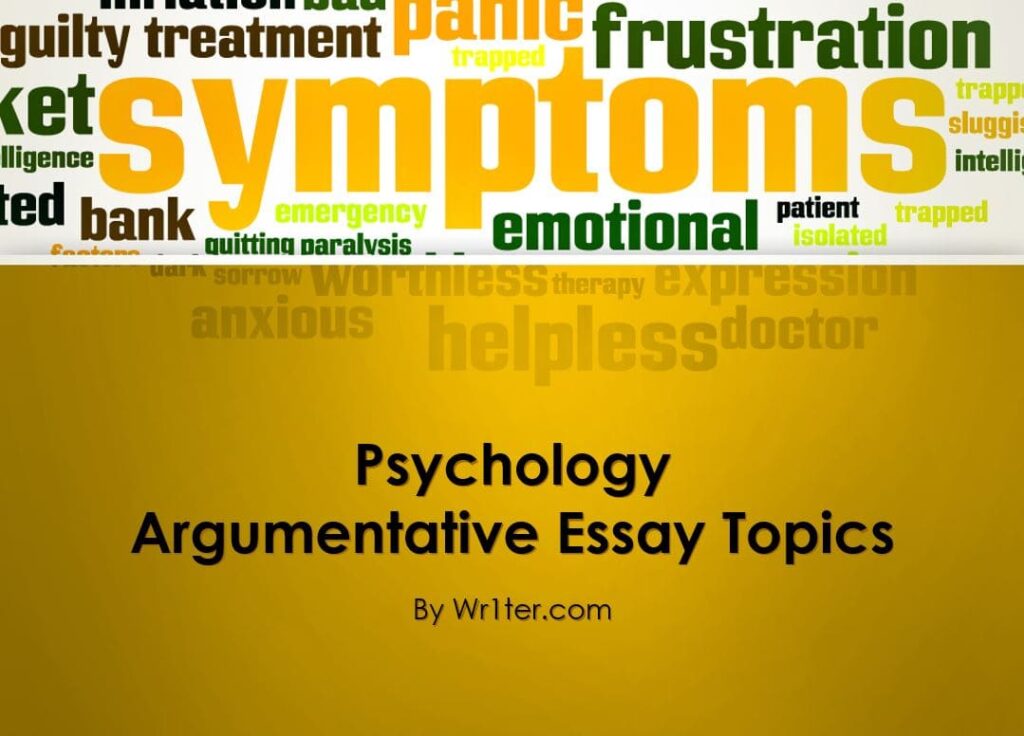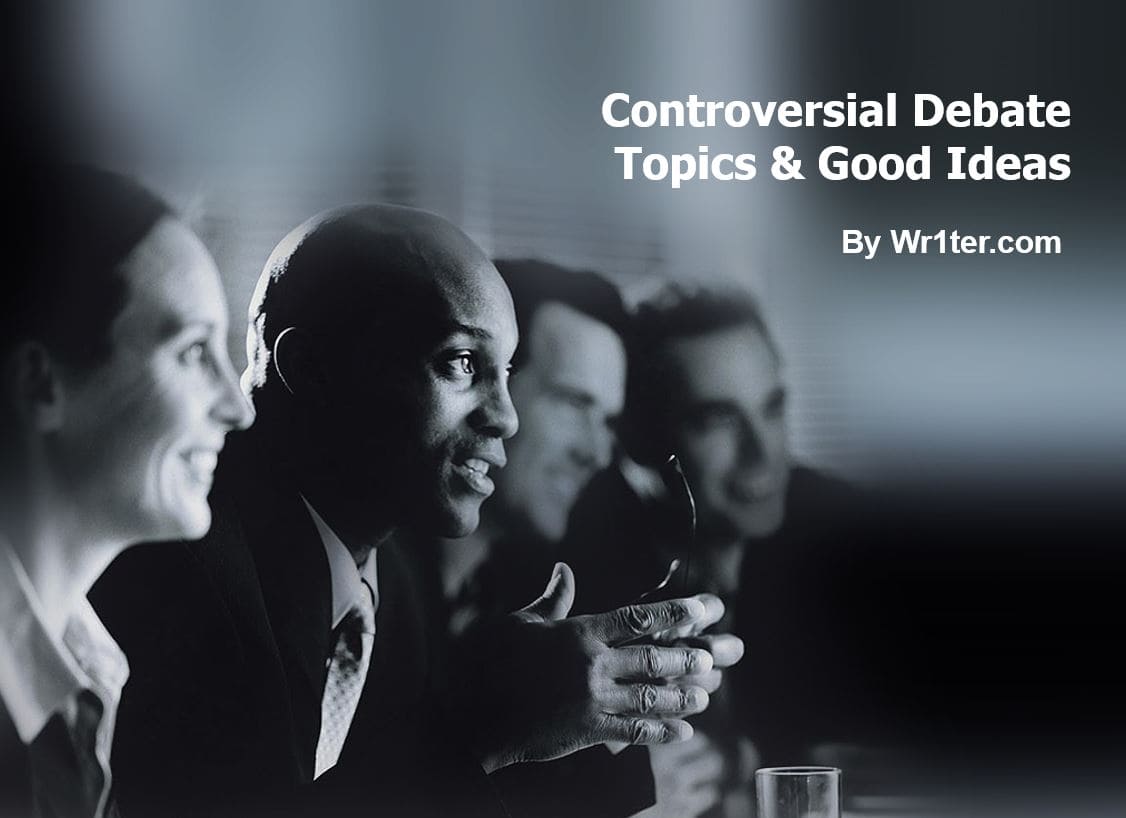Psychology argumentative essay topics offer a rich range of subjects for writing papers, providing valid content to stimulate intellectual debate. These topics span from developmental psychology, exploring how nature and nurture shape human behavior, to the examination of the validity of various mental health diagnoses. In cognitive psychology, topics might argue about the influence of memory and perception on reality or investigate whether artificial intelligence can truly emulate human consciousness. Social psychology subjects can debate the impact of social media on mental health or dissect the cultural nuances of group behavior. Forensic psychology invites debates about the criminal mind, rehabilitation, and the ethics of profiling.Students often analyze these issues by writing a critical thinking essay to develop nuanced arguments. These psychology-based argumentative essay topics provide a platform to critically analyze the current understanding of the human mind, societal influences, and the delicate balance between biology and experience.
What Is a Psychology Argumentative Essay Topic and Its Purpose
According to its definition, a psychology argumentative essay topic is a specific issue or question within a given field that invites critical analysis and debate. For example, the main purpose for selecting a compelling psychology argumentative essay topic is to encourage students to engage with complex psychological concepts, assess varying viewpoints, and articulate well-supported arguments (Kassin et al., 2023). Basically, common ideas revolve around controversial subjects, such as mental health treatment approaches, an efficacy of psychological theories, ethical considerations in research, or some implications of psychological findings on society. Further on, through this process, students enhance their critical thinking and analytical skills while deepening their understanding of psychological principles (Crossley & Tian, 2022). In principle, a well-chosen subject not only stimulates intellectual curiosity but also fosters a dialogue about pressing issues in psychology, encouraging exploration of evidence-based research and ethical considerations. Moreover, such themes serve not only as academic exercises but also as vehicles for social change, challenging prevailing assumptions and advocating for informed practices in mental health and psychological research (Kleemola et al., 2022). As such, the goal is to contribute to a broader discourse in a field and promote awareness and understanding of diverse perspectives that shape psychological practice and theory.

How to Choose
Choosing a relevant psychology argumentative essay topic requires a careful consideration and understanding of several factors to ensure relevance and depth. Firstly, people need to identify areas of personal interest within a field of psychology, as this feature will foster greater engagement and motivation during a writing process (Koons, 2021). In principle, exploring current trends, controversies, or gaps in psychological research can provide a rich source of potential ideas. Further on, engaging with recent publications, academic journals, and reputable sources can help in pinpointing issues that are both timely and significant (Ferretti & Graham, 2019). As such, a good psychology argumentative essay topic should allow for an entire exploration of multiple perspectives, enabling students to present a balanced argument. Moreover, it is crucial to ensure that a selected subject is neither too broad nor too narrow because a well-defined focus will facilitate thorough research and argumentation (Myers & DeWall, 2022). Essentially, considering an availability of credible sources and empirical evidence to support one’s position is vital in establishing a persuasive argument. In turn, some steps for picking a good psychology argumentative essay topic include:
- Identify Personal Interests: Reflect on areas within psychology that intrigue you, as your personal interest will enhance motivation and engagement in your writing.
- Research Current Issues: Explore contemporary debates and emerging trends in psychology by reviewing recent articles, journals, and news, which can provide relevant and timely topic ideas.
- Evaluate a Scope: Ensure your idea is neither too broad nor too narrow since a focused subject allows for comprehensive analysis while avoiding excessive generalization.
- Consider Multiple Perspectives: Choose a psychology argumentative essay topic that presents various viewpoints, enabling a balanced argument and a thorough exploration of a given issue.
- Assess Available Research: Verify an availability of credible sources and empirical data to support your arguments, ensuring that your essay is well-informed and persuasive.
Best Psychology Argumentative Essay Topics
- Roles of Parental Attachment in Child Development
- Importance of Dream Analysis in Understanding Subconscious Thoughts
- Dangers of Prescription Medication Dependence for Mental Health Treatment
- Cultural Influences on Perception and Behavior
- Emotional Intelligence’s Contribution to Career Success
- Roles of Art Therapy in Healing Trauma
- Virtual Reality as a Tool for Phobia Treatment
- Psychological Implications of Long-Term Remote Work
- Influences of Subliminal Advertising on Consumer Behavior
- Hypnosis as a Reliable Technique for Memory Retrieval
- Ethical Concerns in Animal Experimentation for Psychological Research
- Consequences of Prolonged Screen Time on Children’s Cognitive Development
- Autism Spectrum Disorder: Nature vs. Nurture Debate
- Stress Management Strategies: Which Are the Most Effective?
- Impacts of Nature Exposure on Mental Well-Being
- Gender Roles: Their Psychological Effects on Individuals
- Positive Psychology’s Role in Fostering Happiness and Well-Being
- Influence of Stereotypes on Individual Perception and Behavior
- Psychopathy: Is It a Result of Genetics or Environment?
- Body Dysmorphic Disorder and Its Relationship With Social Media
- Psychoanalytic Theory: Its Relevance in Contemporary Psychology
- Potential Effects of Meditation on Anxiety Disorders
- Parenting Styles: How Do They Impact Child Development?
- Narcissistic Personality Disorder: Is Society Encouraging Its Prevalence?
- Music Therapy: An Effective Treatment for Anxiety and Depression?
- Unconscious Bias: Its Effect on Decision-Making Processes
- Efficacy of Animal-Assisted Therapy in Improving Mental Health
Easy Psychology Argumentative Essay Topics
- Nutrition’s Impact on Mental Health: An Underexplored Relationship?
- Conversion Therapy: Ethical Implications and Effectiveness
- Sports and Mental Health: The Positive Connection
- Emotional Abuse: Its Long-Term Effects on Mental Health
- Addiction: A Disease or a Choice?
- Influence of School Environment on Students’ Mental Health
- Existential Crisis: Causes and Psychological Implications
- Power of Placebo: Psychological Aspects of Healing
- Triggers of Post-Traumatic Stress Disorder in Military Personnel
- Perfectionism: A Virtue or a Path to Mental Health Problems?
- Effects of Peer Pressure on Teenage Decision Making
- Color Psychology: Its Impact on Human Behavior and Emotions
- Dementia: Coping Mechanisms for Caregivers
- Effects of Sleep Deprivation on Cognitive Functions
- Stigma Surrounding Mental Health: Causes and Solutions
- Social Isolation’s Impact on Elderly Mental Health
- Behavioral Economics: The Role of Irrationality in Decision Making
- Mindfulness: A Powerful Tool for Mental Health or Just a Fad?
- Influence of Traumatic Events on Personality Development
- Roles of Spirituality in Psychological Well-Being
- Borderline Personality Disorder: Treatment and Management
- Power Dynamics in Relationships: Psychological Implications
- Eating Disorders: The Role of Body Image and Society
- Personality Tests: Valid Psychological Tools or Oversimplified Stereotypes?
Interesting Psychology Argumentative Essay Topics
- Do Subliminal Messages Truly Influence Behavior?
- Laughter Therapy: Its Impact on Stress and Well-Being
- Understanding the Psychological Aspects of Chronic Pain
- Mind-Body Connection: The Role of Psychology in Physical Health
- Animal Intelligence: Are We Underestimating Their Cognitive Abilities?
- Relationship Between Intelligence Quotient and Emotional Quotient: Which Is More Crucial?
- Stockholm Syndrome: Understanding Its Psychological Underpinnings
- Social Comparison Theory: Its Impact on Self-Esteem and Happiness
- Dark Triad of Personality: Understanding Narcissism, Machiavellianism, and Psychopathy
- Roles of Gratitude in Improving Mental Health and Well-Being
- Effects of Modern Lifestyle on Mental Health
- Critical Evaluation of IQ Testing as a Measure of Intelligence
- Neurofeedback: Its Effectiveness in Treating ADHD
- Impact of Climate Change on Mental Health
- Forensic Psychology: The Intersection of Law and Psychology
- Hikikomori: Exploring the Phenomenon of Extreme Social Isolation
- Emotional Labor: Unseen Burdens in the Workplace
- Childhood Bullying: Its Long-Term Impact on Mental Health
- Emotional Resilience: Can It Be Taught?
- Consumer Psychology: The Power of Branding and Advertising
- Attachment Theory: Its Significance in Adult Relationships
- Internet Addiction: A Growing Mental Health Concern
- Dissecting the Bystander Effect: Causes and Implications
- Influence of Birth Order on Personality Traits
- Empathy’s Role in Social Interactions and Relationships
Academic Level Difference
Academic level differences in education significantly influence a selection and complexity of psychology argumentative essay topics. At an undergraduate level, students need to focus on foundational concepts and well-established theories, allowing for subjects that explore basic psychological principles, such as some effects of classical conditioning or a potential influence of social media on mental health (Myers & DeWall, 2022). Basically, these themes emphasize clear argumentation and evidence from introductory research. In contrast, graduate and doctoral students engage with more nuanced and specialized subjects, addressing contemporary debates and emerging research areas (Kassin et al., 2023). For instance, a master’s level essay might investigate an efficacy of specific therapeutic interventions, while a Ph.D. level topic might cover ethical implications of neuropsychological research or intricacies of psychological phenomena in diverse populations. Moreover, higher academic levels necessitate a greater emphasis on critical analysis and a synthesis of complex ideas, requiring students to not only present arguments but also evaluate crucial strengths and limitations of various perspectives (Koons, 2021). Thus, as students progress through their academic careers, key expectations surrounding a depth of analysis, breadth of research, and sophistication of argumentation evolve, leading to increasingly challenging and thought-provoking argumentative essay topics in a field of psychology.
Psychology Argumentative Essay Topics for High School
- Roles of Nature vs. Nurture in Shaping Personalities
- Contribution of Peer Pressure to Teenage Substance Abuse
- Examination of Screen Time Effects on Children’s Development
- Exploration of Mindfulness Practice in Reducing Student Stress
- Impacts of Emotional Intelligence on Academic Success
- Importance of Art Therapy in Promoting Mental Well-Being
- Role of Parenting Styles in Shaping a Child’s Future
- Analysis of the Attachment Theory in Early Childhood
- Evaluating the Effectiveness of Cognitive Behavioral Therapy on Anxiety Disorders
- Effects of School Environment on Student Self-Esteem
- Influence of Divorce on Children’s Psychological Well-Being
- Roles of Positive Affirmations in Boosting Self-Confidence
- Effectiveness of Mind-Body Techniques in Managing Chronic Pain
- Influence of Family Dynamics on Adolescent Self-Image
- Necessity of Mental Health Education in Schools
- Exploration of Hypnosis as a Therapeutic Tool
- Power of Music Therapy in Treating Emotional Disorders
- Impacts of Bullying on a Victim’s Mental Health
- Contribution of Gender Roles to Society’s Mental Health Issues
- Effectiveness of Meditation in Reducing High School Students’ Stress
- Correlation Between Physical Activity and Psychological Well-Being
- Impacts of Sleep Patterns on Adolescents’ Cognitive Function
Psychology Argumentative Essay Topics for Middle School
- Influence of Diet on Mental Health in Teenagers
- Importance of Emotional Support Animals in Mental Health Care
- Roles of Stereotyping in Promoting Discrimination
- Evaluating the Impact of Body Shaming on Teenage Self-Esteem
- Impacts of Parental Addiction on Children’s Mental Health
- Relationship Between Cyberbullying and Teenage Suicide Rates
- Influence of Socioeconomic Status on Adolescents’ Academic Performance
- Importance of Grief Counselling for Bereaved Adolescents
- Roles of Spiritual Practices in Promoting Mental Health
- Correlation Between Childhood Trauma and Adult Mental Health
- Influence of Parenting Styles on Child Development
- Relationship Between Sleep and Mental Health
- Effectiveness of Drug Rehabilitation Programs
- Role of Cultural Differences in Psychological Disorders
- Necessity of Sex Education for Adolescents’ Healthy Development
- Roles of Life Skills Training in Promoting Mental Resilience
- Evaluation of Animal-Assisted Therapy in Children With Autism
- Analysis of the Psychoanalytic Theory and Its Relevance Today
- Effectiveness of Laughter Therapy in Stress Management
- Contribution of Childhood Obesity to Mental Health Issues
- Roles of School Counsellors in Mental Health Promotion
- Effects of Substance Abuse on Family Dynamics
- Impacts of Parental Expectations on Children’s Academic Pressure
- Role of Positive Psychology in Enhancing Students’ Well-Being
- Influence of Peer Relationships on Adolescents’ Social Development
- Importance of Play Therapy for Children’s Emotional Development
- Roles of Self-Efficacy in Achieving Academic Success
- Impacts of Chronic Illness on a Child’s Mental Health
- Effectiveness of Drama Therapy in Treating Trauma
Psychology Argumentative Essay Topics for College Students
- Influences of Advertisements on Consumer Behavior: Psychological Perspective
- Impacts of Social Media Usage on Teenagers’ Mental Health
- Significance of Emotional Intelligence in Academic Achievement
- The Place of Cognitive Behavioral Therapy in Treating Depression
- Does Early Childhood Education Impact Cognitive Development?
- Influence of Stereotypes on Individual Self-Esteem
- The Consequences of Divorce on Children’s Mental Health
- The Effectiveness of Art Therapy for Trauma Patients
- Neurological Changes in Adolescents During Peer Pressure
- Parental Involvement’s Impact on Child’s Academic Performance
- Perceptions of Beauty Standards: Impact on Women’s Mental Health
- The Role of Motivation in Successful Learning
- How Does Attachment Styles Affect Adult Relationships?
- Gender Differences in Coping With Stress: A Psychological Analysis
- Body Dysmorphic Disorder: Impact on the Quality of Life
- Examining Psychological Implications of Chronic Illness
- The Influence of Music Therapy on Patients With Alzheimer’s Disease
- How Does Psychoanalysis Contribute to Understanding Human Behavior
- Is Color Psychology Effective in Marketing and Branding?
- Influence of Sleep Deprivation on Cognitive Functioning
- The Psychology Behind Superstitious Beliefs: An Analysis
- Effects of Multitasking on Productivity and Mental Health
- Discussing the Link Between Creativity and Mental Illness
- The Role of Psychologists in Law Enforcement Agencies
Psychology Argumentative Essay Topics for University
- The Use of Psychotropic Medications in Managing Mental Disorders
- Correlation Between Physical Activity and Mental Health
- Influence of Childhood Bullying on Adult Depression
- The Role of Pets in Improving Human Mental Health
- Group Dynamics: Their Impact on Individual Behavior
- Substance Abuse: Exploring Its Psychological Causes and Effects
- Significance of Subliminal Messages in Consumer Perception
- Eating Disorders: A Societal or Individual Problem?
- The Role of Family Dynamics in Child Development
- Emotional Resilience: Its Importance in Overcoming Life Challenges
- Post-Traumatic Stress Disorder: Challenges and Treatments
- Stigmas Attached to Mental Health: How to Change Perceptions?
- Effects of Procrastination on Students’ Academic Performance
- Relationship Between Self-Esteem and Academic Achievement
- Benefits of Psychological Counseling for University Students
- The Impact of Parenting Styles on Child Behavior and Development
- Bystander Effect: Psychological Reasons and Implications
- Influence of Media Violence on Children’s Aggressive Behavior
- Long-Term Effects of the COVID-19 Pandemic on Global Mental Health
- Childhood Trauma’s Long-Term Effects on Adult Life
- Impacts of Workplace Environment on Employee Stress Levels
- Effects of Social Isolation on Mental Health
- Effectiveness of Mindfulness Techniques in Treating Anxiety
Psychology Argumentative Essay Topics for Master’s and Ph.D.
- Analysis of Cognitive Behavioral Therapy Effectiveness in Treating Post-Traumatic Stress Disorder
- Comparing Child Development in Single-Parent and Two-Parent Households
- Examining the Psychological Impact of Long-Term Remote Work on Employees
- Internet Addiction: Assessing Its Influence on Mental Health
- Dissecting the Intersection Between Criminal Behavior and Mental Illness
- Roles of Play Therapy in Enhancing Social Skills in Autistic Children
- Emotional Intelligence: Its Impact on Workplace Success and Leadership
- Effects of Sleep Deprivation on Cognitive Performance: A Deep Dive
- Understanding the Long-Term Psychological Implications of Childhood Abuse
- Integration of Yoga and Meditation in Psychotherapy: A Revolutionary Approach or a Passing Trend?
- Impacts of Nature Exposure on Mental Well-Being: A Critical Evaluation
- Bullying and Its Correlation With Adolescent Suicide Rates
- Roles of Art Therapy in Alleviating Depression Symptoms
- Unveiling the Effect of the Digital Age on the Human Attention Span
- Probing into the Power of Positive Affirmations in Mental Health Rehabilitation
- Dementia Care: Assessing the Psychological Impact on Caregivers
- Animal-Assisted Therapy and Its Efficacy in Treating Anxiety Disorders
- How Do Childhood Experiences Shape Adult Relationships?
- Mindfulness Practice and its Role in Reducing Stress Levels
- Scrutinizing the Psychosocial Impact of Chronic Illnesses
- Reevaluating the Concept of Masculinity in the Context of Mental Health
- The Psychological Effects of Aging: A Comprehensive Analysis
- Delving Into the Psychological Impact of Climate Change on Individuals
- Does Neurofeedback Therapy Truly Enhance Cognitive Functioning?
- Analyzing the Effectiveness of Group Therapy in Substance Abuse Treatment
- Bilingualism’s Impact on Cognitive Development: A Detailed Study
References
Crossley, S., & Tian, Y. (2022). Argumentation features and essay quality: Exploring relationships and incidence counts. Journal of Writing Research, 14(1), 1–34. https://doi.org/10.17239/jowr-2022.14.01.01
Ferretti, R. P., & Graham, S. (2019). Argumentative writing: Theory, assessment, and instruction. Reading and Writing, 32(6), 1345–1357. https://doi.org/10.1007/s11145-019-09950-x
Kassin, S. M., Privitera, G. J., & Clayton, K. D. (2023). Essentials of psychology. SAGE Publications.
Kleemola, K., Hyytinen, H., & Toom, A. (2022). The challenge of position-taking in novice higher education students’ argumentative writing. Frontiers in Education, 7, 1–14. https://doi.org/10.3389/feduc.2022.885987
Koons, M. (2021). Writing an argumentative essay: The complete introductory guide to writing an argumentative essay for beginner students. Write Illusion LLC.
Myers, D. G., & DeWall, C. N. (2022). Exploring psychology. Worth Publishers.


